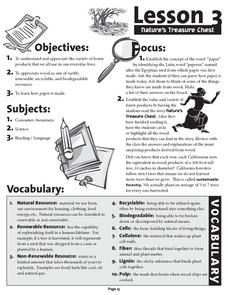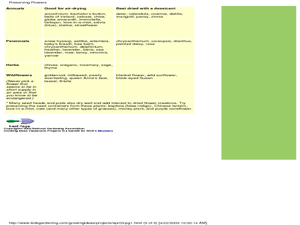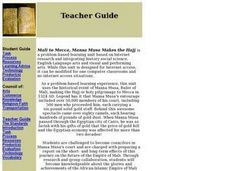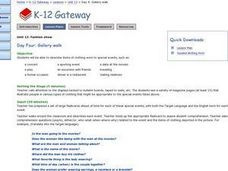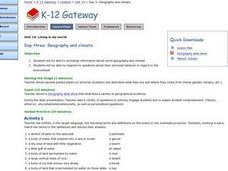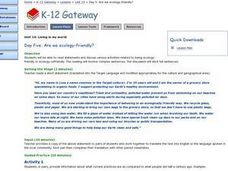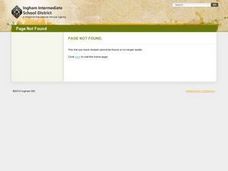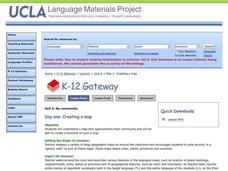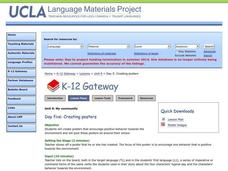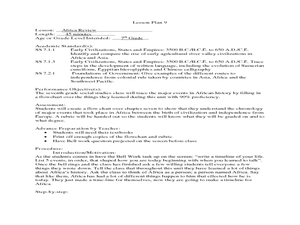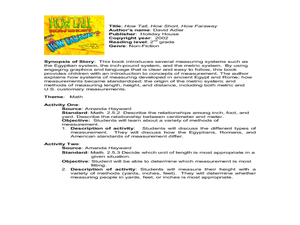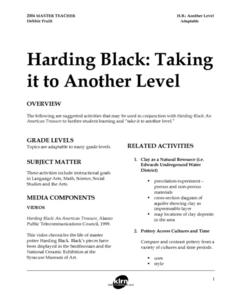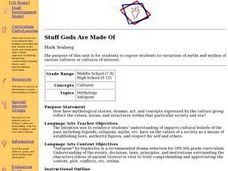Forest Foundation
Nature's Treasure Chest
Renewable, recyclable, and biodegradable. As part of their study of the forest ecosystem, class members read "Nature's Treasure Chest" about the many products made from trees and then craft their own recycled paper.
Curated OER
Detective Digis and the Computer Caper
Mathematicians participate in an hands-on activity to investigate the binary number system and write messages in binary code and have classmates decipher the messages. A said video on the topic does not seem to be available, but the...
Curated OER
Preserving Buds and Blooms
Students learn how to preserve flower buds and blooms. In this gardening lesson, students explore the methods of air drying, using drying agents, and pressing plants to preserve them.
Curated OER
The Mummification Process
Sixth graders investigate the steps of mummification. In this ancient Egypt lesson plan, 6th graders listen to a SMART Board aided lecture to view how mummification works as well as the meaning behind the ritual. Students then complete a...
Curated OER
Teaching Mythology Lessons in a Creative Way
The key to understanding mythology can lie in finding lesson plans that hook students on this fascinating part of history.
Curated OER
MALI TO MECCA, MANSA MUSA MAKES THE HAJJ
Students explore the historical event when Mansa Musa, Ruler of Mali, made the Hajj (or holy pilgrimage) to Mecca in 1324 AD. They create Web pages or PowerPoint presentations maps, charts, posters, and oral presentations with...
Curated OER
Hieroglyphs and Communication
Students compare modern day text messaging with the use of hieroglyphs as forms of communication. They translate hieroglyphic messages written by classmates and check for accuracy.
Curated OER
Egypt's Golden Empire
Students study the queens of ancient Egypt and how they influenced the lives of the Pharaohs and the common people.
Curated OER
What Culture Game?
Students examine artifacts from ancient cultures. They compare the differences and some similarities that may exist . They decide on at least two artifacts per area for each of the three cultures chosen and explore diversity.
Curated OER
What's Behind that Mask?
Learners use a "spider web" graphic organizer to record information about different types of masks they are familiar with. They write a paragraph about masks. Students read about Native American cultures and compare/contrast the...
Curated OER
Unit 2: My Friends and I Day Three: Comparing Our Preferences
Students compare and contrast their characteristics. For this comparison lesson, ESL students compare and contrast personal characteristics while working in pairs. They use a Venn diagram and write in short phrases while making the...
Curated OER
Communicating With My World - Day Three: Internet
Students, who are studying ESL, examine the use of web sites. In this web site lesson plan, students watch a teacher demonstration of different types of web sites. They discuss how much time people spend on the Internet. They take a...
Curated OER
Unit 13: Fashion Show - Day Four: Gallery Walk
Students practice the vocabulary associated with clothing that is worn to special events. In this clothing vocabulary lesson, students, who are ESL learners, practice using works that describe clothing items that are worn for a concert,...
Curated OER
Geography and Climate
Young scholars investigate geographical locations and their own personal experiences with the environment. In this environmental identification lesson, students participate in a match game using certain environmental and...
Curated OER
Are We Ecology-Friendly?
Students explore ecology. For this ecology lesson, students read scenarios, discuss them in groups and decide if they are eco-friendly or not. Students discuss the differences in eco-friendly practices fifty years ago and now. Students...
Curated OER
How Has Math Evolved?
Eighth graders pick a topic or person to research related to the history of mathematics. They brainstorm and create a concept map, using the multimedia software inspiration, about what they are researching and want to examine. They then...
Curated OER
Creating a Map
Learners create a map of their community. In this mapping lesson, students identify various geographical features and the cardinal directions on maps displayed in the classroom. Learners are divided into three groups to create a large...
Curated OER
Creating Posters
Students design original posters that encourage good attitudes towards the environment. In this positive environment lesson, students brainstorm and create a list of positive behaviors for a good environment. Students create...
Curated OER
Presentation of Family Shield or Crest
Learners present their family shield or crest that was created during the first part of this lesson. For this historical arts lesson, students present their family shield to their classmates and are graded based on the included...
Curated OER
Africa Review
Seventh graders trace the major events in African history. In this social studies instructional activity students, create a flowchart depicting the things they learned during this instructional activity. Students understand the...
Curated OER
How Tall, How Short, How Faraway
Second graders determine the correct unit of measure to use for different situations. In this measuring instructional activity, 2nd graders are introduced to different unit of measure. Students study the origin of measurement and...
Curated OER
Harding Black: Taking It To Another Level
Students complete a variety of activities related to the pottery of Harding Black and the uses of clay in San Antonio, Texas. They watch a video about the life of Harding Black, conduct a clay percolation experiment, compare and...
Curated OER
Geometric Art In Our World
Students explore ways art and math can be blended together in world around them. They recognizes geometric shapes and designs in artwork, and create their own artwork blending the two concepts.
Curated OER
Stuff Gods Are Made Of
Students examine different myths of various cultures around the world. Using artwork, they discuss the artistic designs and develop hypothesize about their importance. They use the internet to research myths they are aware of and share...
